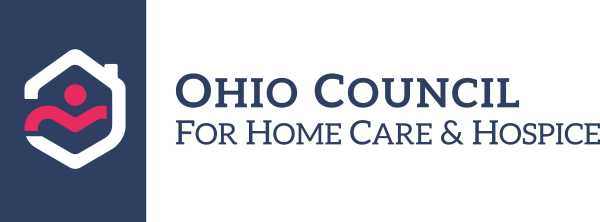MEDICAID ACCESS RULE SUMMARY
On April 22nd, the Centers for Medicare & Medicaid Services (CMS) and the Department of Health and Human Services (HHS) released Final Rule CMS-2442-F, entitled Ensuring Access to Medicaid Services. The CMS fact sheet, with links to the full 1,000+ page rule, can be seen at this link.
The Ohio Council for Home Care & Hospice is providing this update as a high-level summary of what the new rule includes. OCHCH will continue monitoring this policy closely and work with all stakeholders to best advocate for Ohio’s provider agencies. In doing so, we will keep you informed of any new information and insights as the situation develops.
First, let’s begin with the rule summary from CMS:
This final rule takes a comprehensive approach to improving access to care, quality, and health outcomes, and better addressing health equity issues in the Medicaid program across Fee-for-Service, managed care delivery systems, and in Home and Community-Based Services programs. These improvements increase transparency and accountability, standardize data and monitoring, and create opportunities for States to promote active beneficiary engagement in their Medicaid programs, with the goal of improving access to care.
Our take thus far, then the details:
“We are encouraged to see the continued focus on home and community-based care” said Katie Gallenstein BSN, RN, Development & Policy Director at OCHCH. “And though there is still more work to do, we have more leverage than ever before to continue to elevate our industry and ensure that more people have access to quality care in their homes. We believe this rule puts a focus on important data collection, reporting, and the recognition of the need for more consistent state-level rate adequacy.”
“The Ohio Council for Home Care & Hospice is well positioned to support Ohio’s care providers during this time of change,” said Barbara Dixon, BSN, RN, CEHCH, OCHCH Board Chair, Director of Operations at Amedisys. “I’m confident that with the combined experience of our Board of Directors, the Council team, and our extensive network of experts, our members will have the resources and backing they need to navigate this new rule.”
“Just days ago, we led a delegation from Ohio to visit our representatives in Washington DC,” said Lisa Von Lehmden, Executive Director, OCHCH.The overwhelming response from everyone we met was understanding and support, but also an eagerness to learn more about what is really happening at the bedsides and in the living rooms across Ohio, where care is delivered, and how our member agencies are able to continue delivering that care. We will do everything we can to ensure that your story is told, and our elected officials make informed policy choices.”
Katie’s Final Rule Summary and Key Takeaways:
The effective date of the rule is July 9, 2024, but the timeline extends to 2030.
- 2027: Three years from now, states must “report on their readiness to collect data regarding the percentage of Medicaid payments for homemaker, home health aide, personal care and habilitation services spent on compensation to the direct care workers furnishing these services.”
- 2028: In four years, states must “report on the percentage of Medicaid payments for homemaker, home health aide, personal care and habilitation services spent on compensation to the direct care workers furnishing these services, subject to certain exceptions.”
- 2030: In six years (July 9th, 2030), states must “generally ensure a minimum of 80% of Medicaid payments for homemaker, home health aide and personal care services be spent on compensation for direct care workers furnishing these services, as opposed to administrative overhead or profit, subject to certain flexibilities and exceptions.”
The 80/20 provision does NOT apply to State Plan services. It will apply to the following parts of Medicaid:
- 1915(c)
- 1915(i)
- 1915(j)
- 1915(k)
- 1115
There is an allowance, but not a requirement, for states to create certain flexibility for small agencies and hardship exemptions as it relates to the “80/20” rule. Per CMS:
- We are finalizing a policy at § 441.302(k)(3)(ii) that allows States to apply a different minimum performance threshold for small providers.
- We are also finalizing at § 441.302(k)(5) a flexibility to allow States to offer certain providers temporary hardship exemptions.
The “Direct Care Worker” definition is being updated, and clinical supervisors can be included in the compensation calculation.
Per CMS: We are persuaded that nurses or other staff who provide clinical oversight and training for direct care workers participate in activities directly related to beneficiary care (such as completing or reviewing documentation of care), are qualified to provide services directly to beneficiaries, and periodically interact with beneficiaries should be included in the definition of direct care workers at § 441.302(k)(1)(ii). As noted earlier, we are modifying our definition of direct care worker at § 441.302(k)(1)(ii)(F) to clarify that it includes nurses and other staff providing clinical supervision. However, consistent with the proposed rule, our definition is intended to exclude staff who provide administrative supervision (such as overseeing business operations).
Compensation is defined to include:
- Salary
- Wages
- Other remuneration as defined by the Fair Labor Standards Act
- Benefits: Health and dental benefits; life and disability insurance; paid leave; retirement; tuition reimbursement
- The employer share of payroll taxes for direct care workers, specifically including FICA taxes, unemployment insurance, and worker compensation
Excluded Costs (New Policy). These costs are not included in the 80 or the 20:
- Cost of required trainings for direct care workers (such as cost for trainers and training materials)
- Travel Costs for direct care workers (mileage reimbursement or public transportation subsidies)
- Cost of personal protective equipment for direct care workers
Example calculation created and shared by NAHC:

We will continue to monitor the situation and reach out as we have new developments.
Do not hesitate to send us your feedback and questions. Thank you.
Ohio Council for Home Care & Hospice




